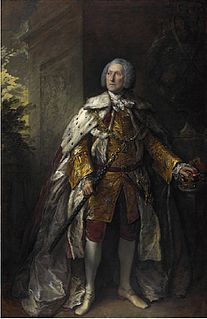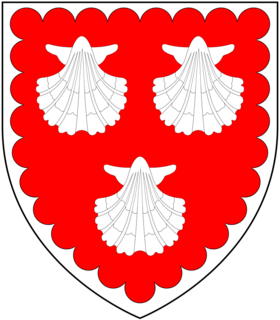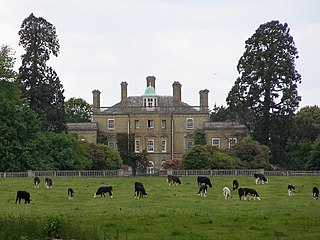Related Research Articles

General John Campbell, 4th Duke of Argyll KT PC, was a British Army officer and Scottish Whig politician who sat in the House of Commons between 1713 and 1761. From 1729 to 1761 he was known as John Campbell of Mamore.

Lieutenant-General John Cutts, 1st Baron Cutts, PC (Ire), was a British soldier and author.

John Smith (1656–1723) of Tedworth House, Hampshire, was an English politician who sat in the English and British House of Commons between 1678 and 1723. He served as Speaker and twice as Chancellor of the Exchequer.
Thomas Holmes, 1st Baron Holmes was a British politician who was Vice-Admiral and Governor of the Isle of Wight (1763–4) and sat in the House of Commons between 1727 and 1774. He managed elections in the government interest in the Isle of Wight during the 1750s and 1760s.

General Thomas Erle PC of Charborough, Dorset, was a general in the English Army and, thereafter, the British Army. He was also a Whig politician who sat in the House of Commons of England and of Great Britain from 1678 to 1718. He was Governor of Portsmouth and a Lieutenant-General of the Ordnance.
Sir Thomas Frankland, 2nd Baronet, of Thirkleby Hall in Yorkshire, was an English landowner and Whig politician who sat in the English and British House of Commons from 1685 to 1711. He was joint Postmaster General from 1691 to 1715.
John Hungerford was an English lawyer and Tory politician who sat in the English and British House of Commons between 1692 and 1729. He was legal counsel for the East India Company, and also defended several of those accused of being Jacobites in the years following the rising of 1715.
Brigadier General Thomas Stanwix was a British Army officer and politician who sat in the House of Commons from 1702 to 1725. He served as Governor of Gibraltar.
Henry Holmes of Thorley, Yarmouth, Isle of Wight, was an Anglo-Irish Army officer, landowner and Tory politician who was Lieutenant-Governor of the Isle of Wight (1710–14) and sat in the English and British House of Commons from 1695 to 1717.
John Pulteney, of St James's, Westminster and Harefield, Middlesex, was an English lawyer and Whig politician who sat in the English and British House of Commons from 1695 to 1710.

Sir Edward Ernle, 3rd Baronet of Charborough in Dorset, of Brimslade Park and Etchilhampton, both in Wiltshire, was an English Whig politician who sat in the English and British House of Commons between 1695 and 1729. He had mixed fortunes in finding or holding a seat and often depended on his father-in-law to bring him into his own seat at Wareham when a vacancy arose.
Sir Rushout Cullen, 3rd Baronet (1661–1730), of Upton, Ratley, Warwickshire and Isleham, Cambridgeshire, was an English landowner and Whig politician who sat in the English and British House of Commons between 1697 and 1710.
Richard Sutton, of Scofton, Nottinghamshire, was British Army officer who fought in the War of Spanish Succession, and a politician who sat in the House of Commons between 1708 and 1737. He was primarily a Whig, but on occasion voted as a Tory.
Lieutenant-Colonel Henry Worsley, of Compton, Hampshire, was an English Army officer, diplomat and politician who sat in the English and British House of Commons from 1705 to 1715, initially as a Whig, and later as a Tory. He was ambassador to Portugal from 1714 to 1722 and Governor of Barbados from 1722 to 1731.

Sir Arthur Owen, 3rd Baronet, of Orielton, Pembrokeshire, was a Welsh Whig politician who sat in the English and British House of Commons between 1695 and 1727.

Sir James Worsley 5th Baronet (1672–1756) of Pylewell Park, Hampshire was a British landowner and politician who sat in the English and British House of Commons between 1696 and 1741. He tended to support whichever administration was in power.
Sir Tristram Dillington, 5th Baronet of Knighton, Isle of Wight was a British Army officer, landowner and Whig politician who sat in the House of Commons between 1707 and 1721.
William Jessop of Broom Hall, Sheffield, Yorkshire, was an English lawyer, and Whig politician who sat in the English and British House of Commons for 32 years between 1702 and 1734. He was a judge on the Anglesey and Chester circuits.
Maurice Morgan (1692–1733) of Freshwater, Isle of Wight, was a British Army officer and politician who sat in the House of Commons from 1725 to 1733.
William Thompson, of Humbleton, Yorkshire, was a British Whig politician who sat in the House of Commons between 1701 and 1744.
References
- 1 2 "MORGAN, Anthony (d. 1729), of Freshwater, I.o.W." History of Parliament Online (1690-1715). Retrieved 18 August 2018.
- 1 2 "MORGAN, Anthony (d.1729), of Freshwater, I.o.W." History of Parliament Online (1715-1754). Retrieved 18 August 2018.